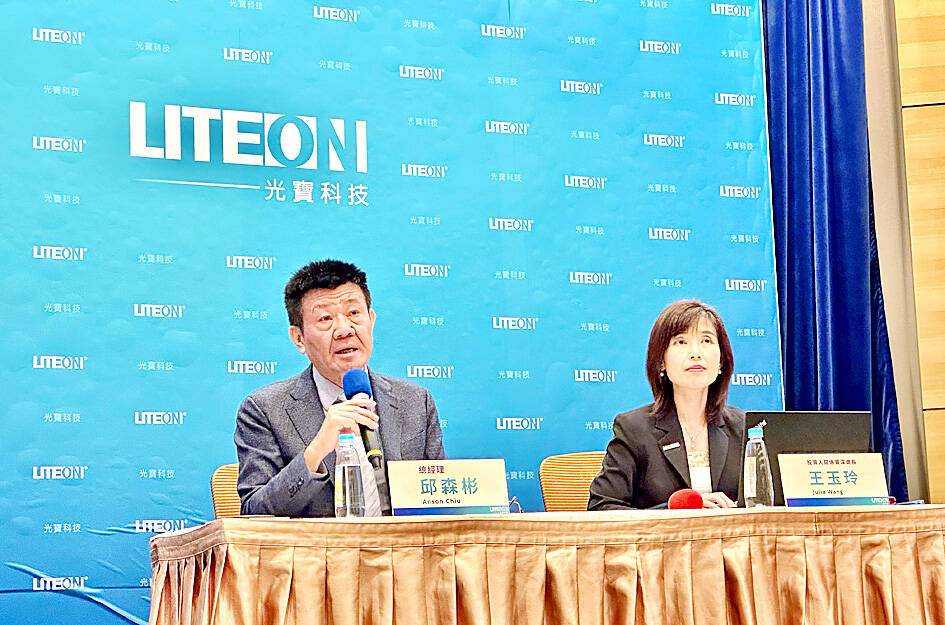Electronic components supplier Lite-On Technology Corp (光寶科技) posted the best quarterly net profit in its history last quarter at NT$4.56 billion (US$140.63 million), as gross margin improved thanks to an increase in shipments of better-margin power supplies for artificial intelligence (AI) servers and cloud-computing data centers, it said yesterday.
Last quarter’s net profit rose 9 percent sequentially from NT$4.2 billion, or 7 percent annually from NT$4.24 billion. Earnings per share rose to NT$1.99 last quarter from NT$1.84 in the second quarter and NT$1.86 last year.
That was despite the company’s revenue growth falling short of expectations as high inflation, geopolitical tensions and a weak macroeconomy dampened consumer spending during the quarter ending Sept. 30, Lite-On said.

Photo: Fang Wei-chieh, Taipei Times
Revenue last quarter experienced sub-seasonal growth, Lite-On said.
However, the firm’s gross margin grew to an all-time high of 23.6 percent last quarter from 23.3 percent a quarter earlier and 19.5 percent a year earlier, which it attributed to optimized product portfolios.
Lite-On’s operating profit margin improved to 11.6 percent from 9 percent in the second quarter and from 9.5 percent a year earlier.
The company said it expects revenue to grow at a mild pace this quarter, compared with NT$39.96 billion last quarter, as demand for components used in notebook computers and some consumer electronics started to pick up slightly.
“Business in the fourth quarter should be relatively lukewarm compared with the company’s records in the past,” Lite-On president Anson Chiu (邱森彬) told investors yesterday.
“Overall, we are relatively optimistic about the company’s ability to register a stable growth in revenue and profit during the fourth quarter, though the macroeconomic outlook remains bleak,” Chiu said.
This quarter’s main growth drivers would be high-margin power supplies used in cloud-computing servers and automotive devices, Chiu said.
US auto workers and automakers are resolving their conflicts and the supply of graphics processing units used in AI servers is improving, which would help fuel some demand this quarter, he added.
Demand for information and communications technology and consumer electronics have apparently bottomed out, Chiu said.
Notebook computer sales expanded year-on-year in the third quarter, while desktop computer sales would post an annual increase in the first quarter of next year, he added.
Lite-On expects revenue for this year to hold steady compared with last year, Chiu said.
Next year, the company is pushing for mergers and acquisitions to stimulate revenue growth, he added.
Lite-On said it is deploying two production lines in Dallas, Texas, which would contribute NT$2 billion in revenue next year, Chiu said.

Macronix International Co (旺宏), the world’s biggest NOR flash memory supplier, yesterday said it would spend NT$22 billion (US$699.1 million) on capacity expansion this year to increase its production of mid-to-low-density memory chips as the world’s major memorychip suppliers are phasing out the market. The company said its planned capital expenditures are about 11 times higher than the NT$1.8 billion it spent on new facilities and equipment last year. A majority of this year’s outlay would be allocated to step up capacity of multi-level cell (MLC) NAND flash memory chips, which are used in embedded multimedia cards (eMMC), a managed

In Italy’s storied gold-making hubs, jewelers are reworking their designs to trim gold content as they race to blunt the effect of record prices and appeal to shoppers watching their budgets. Gold prices hit a record high on Thursday, surging near US$5,600 an ounce, more than double a year ago as geopolitical concerns and jitters over trade pushed investors toward the safe-haven asset. The rally is putting undue pressure on small artisans as they face mounting demands from customers, including international brands, to produce cheaper items, from signature pieces to wedding rings, according to interviews with four independent jewelers in Italy’s main

CULPRITS: Factors that affected the slip included falling global crude oil prices, wait-and-see consumer attitudes due to US tariffs and a different Lunar New Year holiday schedule Taiwan’s retail sales ended a nine-year growth streak last year, slipping 0.2 percent from a year earlier as uncertainty over US tariff policies affected demand for durable goods, data released on Friday by the Ministry of Economic Affairs showed. Last year’s retail sales totaled NT$4.84 trillion (US$153.27 billion), down about NT$9.5 billion, or 0.2 percent, from 2024. Despite the decline, the figure was still the second-highest annual sales total on record. Ministry statistics department deputy head Chen Yu-fang (陳玉芳) said sales of cars, motorcycles and related products, which accounted for 17.4 percent of total retail rales last year, fell NT$68.1 billion, or

In the wake of strong global demand for AI applications, Taiwan’s export-oriented economy accelerated with the composite index of economic indicators flashing the first “red” light in December for one year, indicating the economy is in booming mode, the National Development Council (NDC) said yesterday. Moreover, the index of leading indicators, which gauges the potential state of the economy over the next six months, also moved higher in December amid growing optimism over the outlook, the NDC said. In December, the index of economic indicators rose one point from a month earlier to 38, at the lower end of the “red” light.